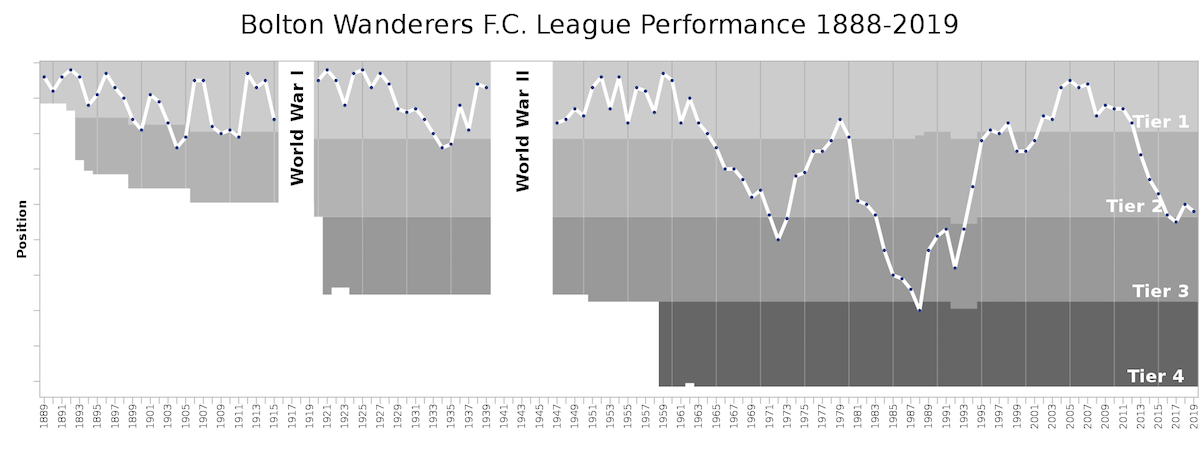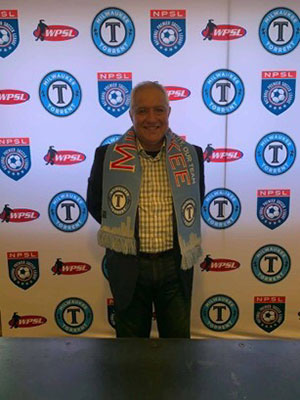Murdering An Idea
There’s a great exchange between the comedian and noted atheist Ricky Gervais and Stephen Colbert on Colbert’s The Late Show. Gervais was asked about his lack of belief in a god by Colbert, a Catholic. In response, Gervais first asked Colbert if he believed in a god, which Colbert admitted. Then Gervais responded, “Okay. But there are about 3,000 to choose from… Basically, you deny one less God than I do. You don’t believe in 2,999 gods. And I don’t believe in just one more.” Rejecting an idea entirely is only a single step further than rejecting all the other forms of an idea.
In 1894, the American Association of Professional Football was formed. It died the same year. In 1921, the American Soccer League, home of Bethlehem Steel and Fall River Marksmen was born. In 1933, facing the financial stress of the Great Depression, it collapsed. In 1960, the International Soccer League was born and in 1965 it withered away. The North American Soccer League, the league that brought Pele to the United States, lived from 1968 to 1984. In 2019, the NPSL Founders Cup, due to the exit of multiple clubs, was renamed and reformulated, effectively killing the competition in its crib. There is a long list (a much, much longer than this very brief list) of men’s and women’s soccer leagues in this country which have died. And there are a hundred different varieties of causes of those deaths, and even that list doesn’t include all of the women’s leagues that have come and gone. So maybe, instead of focusing on the league that died this week (and the new one that took its place), it’s time we found a new perspective of the American idea of soccer leagues.
The collapse of NPSL Founders Cup (and the NPSL may deny it collapsed, but that’s what happened) was brought about by a better resourced, flashier league, and, most importantly, one that has officially earned D3 sanctioning from U.S. Soccer. That league is the National Independent Soccer Association (NISA) and when it was originally formed there was a massive buzz within the lower league soccer press. At its formation, clubs had not been named formally, but NISA announced it would begin play in the Fall of 2018 with 8 teams in multiple markets across the country.
Then the league effectively went silent. So much so that it became a running joke on social media. However, in May of this year there was a shakeup in leadership which led to the exit of Bob Watkins and John Prutch taking over the commissioner’s chair. Since Prutch took over, the league has become much more active online and has quickly gathered new clubs into the league, mostly at the expense of the NPSL and Founders Cup. First, Miami FC and California United Strikers were approved to join the league in the beginning of June. Then, just a couple of weeks later, Oakland Roots, one of the gems of the upcoming Founders Cup, announced they too would be joining NISA in the Spring of 2020.
After the exit of three of their original “founders,” NPSL was forced to reformulate the pro league from the ground up. Founders Cup had been formed as separate from the NPSL, an entirely independent entity. So much so that the league forwarded information requests about Founders Cup to four FC club owners instead of responding from the league. This week, NPSL announced a rebranding of the pro league - “NPSL Members Cup.” The Members Cup will host 6 teams, with a season to run from August 10th to October 26th. Honestly, no matter how the league spins it, it’s a black eye for the NPSL and hampers their plan to grow a new pro league.
For fans of the NPSL, there is an uncomfortable, almost visceral, response to all of this news. Are the clubs that exited Founders Cup traitors? Should they be seen as opportunists who exploited a situation? Is what they did right or fair? But the tenuous relationship with NISA and its newly-joined clubs is only an extension of the weirdness surrounding professional clubs in the lower leagues in general. While the vast majority of the lower leagues are amateur, many clubs are rumored to pay their players, regardless of league rules. Those rumors swirl every time those clubs succeed on the field, though mostly in anonymous twitter posts and DMs. “You know they pay their players, right? That’s how they win.” Regardless, the idea of clubs paying players is a pressure point for many fans.
So with the emergence of these new “lower league, professional leagues,” fans are often forced to decide the style and designation they prefer to support. Some draw the line at amateurism. Some stick with their clubs as they transitioned. Some are optimistic that this development would lead to promotion/relegation. Some just mock the lower leagues for being confusing and made memes to troll everyone involved. The reality is that the loyalty of the lower league fanbase is being actively fractured and how this all ends is still in the air. But all this fracturing of loyalties is unnecessary and pointless if lower league soccer fans, actually all soccer fans, begin to put club over league.
“Would you stick with the Cleveland Browns if they got relegated to NCAA DII? In the case of Bolton’s fans, the answer is yes.”
It is only in the United States that fans are pushed to be fans of a league. The concept of a league is dominate in American sports. Consider the National Football League and its monopoly over the sport of american football. There are competing football leagues, of course, but most of those are seen as a joke and not taken seriously by fans of the sport. The NFL is seen as the only important pro league in the sport and the league has groomed this image to maintain its control over fans and their dollars. The other big sports league in this country have all taken similar approaches. Major League Baseball (MLB), the National Basketball Association (NBA), and the National Hockey League (NHL) have all groomed the idea that their leagues are the best in their respective sports. It’s good business sense. If people believe you to be the best, they’ll be fans of your member clubs, driving up the worth of your league. American sports leagues have done such a great job at propagating this idea that the major American sports leagues are now worth hundreds of BILLIONS of dollars. But you don’t have to buy that idea.
While the English Premier League (EPL) is also worth billions of dollars (maybe trillions, honestly), that league doesn’t hold value the way the American systems do. In English soccer, the EPL is nothing more than a container for the clubs that play within it in a given season. Underperform and you’re out. Manchester City, who won the league last season, was relegated as recently as 2001. Manchester City fans weren’t told to root for Manchester United when their club was relegated. They simply cheered for their club to win the Championship (the name of the second tier English League) and regain promotion to the top tier. That would be even more complicated for fans of a club like Bolton Wanderers, who have dipped in and out of the top tier and who were just relegated to the third tier after a season of massive financial hardship. Would you stick with the Cleveland Browns if they got relegated to NCAA DII? In the case of Bolton’s fans, the answer is yes.
Image from Wikipedia and is the work of Wikipedia contributor EclecticArkie
That’s because the idea of a league, regardless of how famous it is, means nothing more than the quality of the clubs that populate the table. If your club can’t measure up, it will end up in the level that it can compete at. Loyalty to the club is encouraged, because the league is always secondary from the fan’s perspective.
It’s easy to get hung up on leagues, particularly in the United States. The US Soccer Federation and this country’s soccer media is so guilty of this. Major League Soccer (took a long time to get to MLS, but here it is) began play in 1996, formed to meet the FIFA qualifications for hosting the 1994 World Cup. While the league has struggled, it has managed to grow to the point of sport dominance in the United States. The level of play within the league is good enough to be the best in the country, but it has woefully underperformed against clubs from other leagues, particularly against Liga MX clubs. In fact, in CONCACAF Champions League (previously known as Champions League Cup), the only formal head-to-head competition between members of the two leagues, it has been 19 years since the last MLS club won the title. In that time, a Mexican side has won 17 titles (Costa Rican teams won in 2004 and 2005). So the league is clearly inferior to continental competition, let alone the massive European leagues that dominate the sport.
Christos celebrates against DC United. Image courtesy of Baltimore Sun.
Regardless of this inferiority in quality, MLS continues to be the only league focused on by the national media, NWSL included. The Federation seems intent on focusing entirely on setting the league up for success, even at the detriment of the leagues that fill the pyramid below the top tier. Consider the U.S. Open Cup. The scheduling has been criticized by lower league clubs for years as being difficult at best (in some cases impossible) for clubs not in MLS. The competition forces grassroot clubs to play 3 or 4 rounds of qualifying matches before even entering the competition, while MLS clubs do not enter the competition until the 4th round and often host matches, forcing the less-funded club to shoulder travel expenses. If a lower league club makes it to the 4th round, which rarely happens (Christos in 2017), they typically must play 7 or 8 matches to get to there.
Some might argue that the white-gloved treatment of MLS is due to the track record of league failure in the United States. Those people are thinking about the situation from a league centric perspective. If MLS was simply the name of the top tier and not a single-entity monster clinging to the top of the pyramid, the league would simply expand and contract as clubs exited downward and entered upward. The focus would be on the success and failure of the clubs and the sport itself, the league would be secondary. And yes, that is an argument for promotion/relegation, but fans of MLS clubs would be less wary of the idea if the focus was less on MLS and more on the clubs that filled the league currently.
Don Garber, Commissioner of MLS, has sold an idea to the American soccer fan. That idea has been regurgitated by the soccer media figures in this country. That same idea has been saluted and heralded by the Federation. That idea is that the league is more important than the clubs that exist within it. That idea has worked for every other league in the United States, so far. But it doesn’t have to be that way.
So instead of bemoaning the loss of Founders Cup and trying to decide what to make of NISA, maybe it’s time for American soccer fans to consider looking at leagues differently. Only one fan base has been aggressive and public about their feelings on the matter. And while Northern Guard supporters can be rough around the edges and irritate with their over-the-top support for their club, they are absolutely correct about this - club over league. If there is anything that the history of American soccer has proven, it is that leagues will come and go. But, more importantly, when the fans back their club, they will last forever.
- Dan Vaughn














